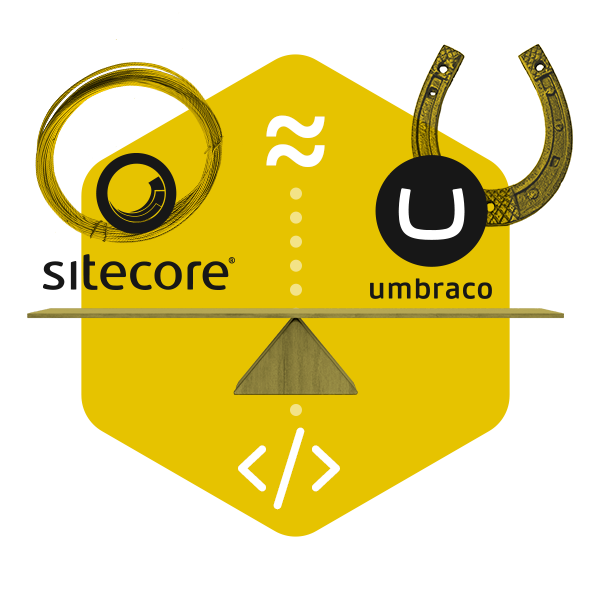As a web development agency offering both Sitecore and Umbraco to our clients, we understand the challenges businesses face when choosing a CMS. To add to our previous comparison series of Umbraco vs Drupal, Umbraco Vs Kentico and Kentico vs Drupal, we've compiled a fact-based comparison of these two platforms based on user feedback and feature strengths.

What is Sitecore? Which CMS is Best for Enterprises?
A high-end digital experience platform (DXP) that integrates CMS functionality with advanced marketing tools. Designed for enterprises, it excels in personalisation, scalability and customer insights.
Sitecore is best suited for large organisations with complex digital needs. However, its higher cost and complexity may not be ideal for smaller businesses or those without dedicated technical teams.
What is Umbraco? Which CMS is Better for SMBs?
An open-source CMS built on .NET, known for its flexibility, affordability and user-friendly design. It’s a great choice for businesses looking for a customisable, developer-friendly platform.
Umbraco regularly updates its versions, with Umbraco 15 being the latest. Umbraco is a versatile and cost-effective CMS that suits businesses of all sizes. It’s a particularly good fit for companies looking for a lightweight, straightforward solution without sacrificing customisation.
For this section of our comparison, we’ve referred to G2’s Sitecore vs Umbraco page, which includes users' real feedback. Both CMS platforms are rated out of 10 across multiple categories based on insights from reviewers.
| Which CMS Better Meets Users' Requirements?
Sitecore: 8.2/10 from 289 users Umbraco: 8.6/10 from 592 users Both platforms meet user expectations effectively, but Umbraco’s slightly higher score reflects its ability to satisfy diverse business needs with fewer barriers. |
Which CMS Has Better Ease of Use?
Sitecore: 7.0/10 from 293 users Umbraco: 8.7/10 from 601 users Umbraco’s simplicity is a standout feature, allowing marketers and non-technical users to navigate easily. Sitecore's powerful tools require more technical expertise, resulting in a steeper learning curve. |
| Does Sitecore or Umbraco Have Better Ease of Setup?
Sitecore: 5.8/10 from 183 users Umbraco: 8.5/10 from 487 users Setting up Sitecore can be complex, reflecting its enterprise-grade infrastructure. Umbraco offers a more straightforward setup process, making it a preferred choice for smaller teams. |
Does Umbraco or Sitecore Have Better Quality of Support?
Sitecore: 7.3/10 from 261 users Umbraco: 8.2/10 from 502 users Umbraco has an active, supportive community alongside professional support. Sitecore offers robust enterprise-level support, but its complexity can sometimes delay issue resolution. |
| Which CMS Has Better Business Partnership Opportunities?
Sitecore: 7.6/10 from 168 users Umbraco: 8.7/10 from 412 users Umbraco’s open-source nature fosters strong partnerships with agencies and developers, while Sitecore’s approach focuses on enterprise-scale collaborations. |
Which CMS Has Better Product Direction (Positive Feedback)?
Sitecore: 7.9/10 from 268 users Umbraco: 8.8/10 from 561 users Both platforms are committed to evolving with market trends, but users have expressed greater confidence in Umbraco’s roadmap, citing its openness to feedback and consistent updates. |
Sitecore uses a proprietary licensing model, making it expensive for smaller businesses. Its costs are designed for enterprises and can rise with project size, users and features.
Umbraco, as an open-source CMS, is free to use, with optional paid services like Umbraco Cloud and Support for extra features or hosting. This flexibility makes Umbraco a cost-effective choice for businesses of all sizes.

Both Sitecore and Umbraco are built on the .NET framework, making them ideal for businesses already invested in Microsoft technologies. However, they approach development differently.
Sitecore is designed for enterprise-level applications and often requires a team with advanced .NET expertise to fully utilise its capabilities. Its steep learning curve can pose challenges for smaller teams or those new to .NET development.
Umbraco stands out for being developer-friendly and open-source and has an active community which makes it more accessible.
Sitecore is built for enterprise-level scalability, making it ideal for large organisations with complex needs. Its modular design allows seamless customisation and integration with third-party tools. Sitecore also excels in personalisation, offering advanced tools like the Experience Database (xDB) to deliver tailored experiences based on user behaviour and data.
Developers can create customised solutions without the high costs of licensing. While its personalisation features are less advanced than Sitecore’s, integrations with third-party tools or Umbraco’s ecosystem can address these needs.

Sitecore offers advanced marketing tools, including automation, analytics, and personalisation features, enabling marketers to create data-driven campaigns. Its SEO tools are designed for enterprise websites, and it excels in performance, handling complex, high-traffic environments with ease.
Umbraco prioritises simplicity and ease of use, with intuitive content editing tools that are ideal for non-technical users. While its marketing features are not as comprehensive as Sitecore’s, third-party integrations can enhance its capabilities. Umbraco’s open-source nature ensures strong performance, and developers can easily customise SEO and speed.
Sitecore excels at managing multiple customer touchpoints, running data-driven campaigns, and personalising content based on user behaviour. However, Sitecore’s complexity and high cost may be a challenge for smaller businesses.
Umbraco offers a more flexible and affordable solution. While it lacks some of Sitecore’s advanced marketing tools, Umbraco is easy to use, highly customisable, and integrates well with other systems. Its open-source nature also gives B2B businesses more control over their website and content management.

Sitecore provides advanced multi-language support with its robust globalisation and localisation features. It allows businesses to create and manage websites in multiple languages, offering tools to tailor content for different regions.
Umbraco offers basic language variations for managing content in different languages, but may need third-party tools or customisation for advanced translation features. However, its flexibility allows for custom integrations to enhance its multi-language capabilities.
Sitecore offers enterprise-level customer service, including dedicated account managers, 24/7 support, and a large knowledge base. This support is ideal for businesses that require ongoing assistance and are willing to invest in premium service. Sitecore has a wide range of training resources and a large community of developers to help with troubleshooting.
Umbraco provides strong community support through forums, online documentation and active developer communities. While it doesn’t offer the same level of premium support as Sitecore, Umbraco does provide commercial support through paid plans for businesses that require more direct assistance.

The Sitecore Experience Commerce (XC) platform integrates seamlessly with the CMS. This provides B2C and B2B businesses with advanced features like personalisation, customer insights and integrated marketing campaigns. However, its complexity and cost might be a drawback for smaller eCommerce businesses.
Umbraco doesn’t have a built-in eCommerce solution, but it supports eCommerce integrations through third-party platforms like uCommerce. These integrations allow businesses to create eCommerce websites with full functionality, including product management, payment processing, and order tracking. While Umbraco’s eCommerce capabilities may not be as advanced as Sitecore’s, it offers a more cost-effective and flexible solution for small to medium-sized businesses looking to build an online store.
Sitecore provides strong security features, including role-based access controls, data encryption, and advanced authentication protocols. Sitecore also offers regular security updates and patches, which are essential for businesses operating in industries with high compliance requirements.
Umbraco has a strong focus on security but relies on its community and developers to ensure regular updates and vulnerability patches. Umbraco also offers a paid support plan, which includes additional security features and updates, making it a secure option for businesses willing to invest in maintenance and ongoing protection.
The decision between Sitecore and Umbraco ultimately depends on your business goals, technical expertise and budget. Sitecore might be the better option if you need a feature-rich enterprise platform that supports advanced marketing strategies and scalability. Opt for Umbraco if you value simplicity, affordability, and developer-friendly customisation.
